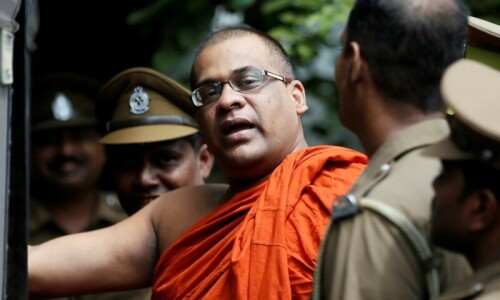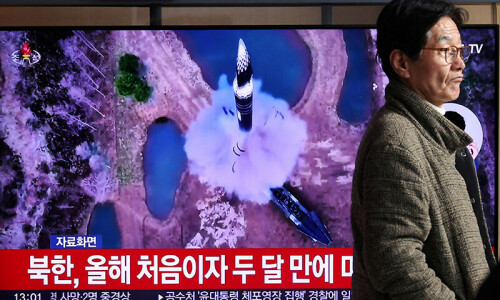We are happy to learn that the EU delegation expressed satisfaction on Wednesday about the Election Commission’s preparation for holding the general election.
However, recently we had seen some serious concerns expressed by the international community about our elections. The most important voice was that of the Secretary General of the UN. We know what a great friend of Bangladesh Ban Ki-moon is. Already he had sent his emissaries twice to help cobble together an understanding between our two feuding leaders to hold free and fair elections. At the end of the second visit, things seemed to have progressed so much that a beginning of a dialogue between AL and BNP appeared only days if not hours away. Those attempts having failed, finally he telephoned and urged Sheikh Hasina and Khaleda Zia to resolve their differences and set an amicable path for the polls.
Most recently US Secretary of State John Kerry undertook a similar exercise, this time writing two separate letters to our two leaders, and for the same end.
The question for us to ask is, don’t these international voices, expressing unambiguous concern about our political future, mean anything to us? Are we going to be so oblivious to these expressions of concerns as if we live in a different planet or that we are not a part of the present day international world order or that we have nothing to gain by co-operating more with them?
The Bangladesh Nationalist Party (BNP) is saying all the right things about the need for a dialogue, almost echoing the international community’s voice, simply because it suits them.
On the contrary, and as can be expected, the ruling Awami League (AL) is taking the view that it is an interference in our internal affairs. So their predictable reply is “leave it to us, we’ll sort it out ourselves” and indirectly expressing its wariness about all the interest that the UN, US, UK, EU, China and others are showing.
Technically, we would favour the AL’s position. The election is to elect a government by and for the people of Bangladesh, and hence, should not be a concern of any other state, organisation or nation.
But technicality is not what an election is all about. It is not just a technical matter that an election is held every five years, nor is it a technical matter that people choose new leaders who will run the country for the next five years. It is a matter of the public expressing its “Will” without any fear or intimidation.
What the AL is failing to understand, especially Sheikh Hasina, is that one can perhaps run a government according to one’s wishes (though it should not), it definitely cannot run an election according it own sweet will. The first and foremost prerequisite of an acceptable election (acceptable not only to the international community, but more importantly to us as people of Bangladesh) is that it is participated by all contending parties, definitely by the biggest opposition party. If the opposition does not participate then the election is one sided and unrepresentative.
Is the opposition’s fear unreasonable that elections held under the present provisions of the Constitution run the risk of being tampered with? Does it have sufficient ground to suspect that elections, as currently prescribed, will not be free and fair? Is the opposition just being obstructionist for the sake of embarrassing the government or is its fear well founded?
In our view it is not only the opposition but people in general feel that elections under a party government will not be free and fair. All the recent opinion polls, carried out by various governmental and non-governmental bodies, mostly local but some foreign, have indicated that the general public believes that only a non-partisan interim government can ensure a free and fair election.
The AL along with the government is crying itself hoarse that it has conducted more than five thousand free and fair elections to different local government bodies and by-elections to some parliamentary constituencies including five mayoral elections under its stewardship and hence it should be trusted to hold the national elections in the same manner. This shouting fails to reassure the voters simply because those elections did not lead to change of power of the national government. When will the ruling party learn that ‘trust’ has to be earned, and cannot be forcibly extracted from others, especially opponents?
Even if we sympathise with AL’s dislike for international concerns, we are forced to say that it has been brought upon us by its refusal to engage the opposition in any meaningful dialogue. Yes, there have been occasional speeches or press comments that “we are ready to sit anytime, anywhere” by AL leadership, but nothing came of them due to lack of sincerity on both sides.
We said so before and repeat now, that as the ruling party and as the party that brought about the constitutional amendment which lies at the root of the present problem, it was AL’s duty to initiate sincere attempt for an understanding with BNP. If the international community is publicly expressing its concern, it has ample reason to, and has been brought upon us by our political leadership.
For the last two years — ever since the caretaker system was abolished — all sections of our society, including the media and civil society leaders, have been urging for talks and insisting that unless an understanding was reached, elections would be jeopardised. All the suggestion of these bodies and individuals were rejected with scorn and in mockery saying that “those who are not elected, or those who cannot get any vote or dare to get elected” should not give advice about political matters. Such exclusionist and disdainful attitude of AL leaders cut them off from the collective wisdom of the society whose only intention was to strengthen our democratic system.
Thus when AL, in reference to the political impasse and the resultant concern by the international community says, “it is our problem and we will solve it by ourselves,” very few people give it any credence simply because AL’s track record does not generate such confidence.
We would like to state, in the strongest possible terms, that the concern expressed by the international community is not only their own but also shared by all sections of the thinking public in the country. We are all concerned at the prospect of violence in the coming days, at the possibility that the coming elections will not be held in an environment conducive to the participation of all the people and that our democratic process may face a serious setback.
It is our view that the PM is hurting the country, hurting our democracy and her own legacy by stubbornly refusing to move in the direction of understanding based on dialogue.
— By arrangement with The Daily Star/ANN












































